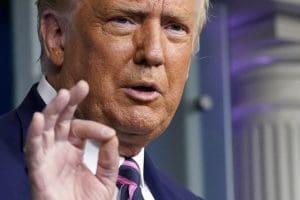Opinion: 3 national crises and 1 chance to get rid of Trump
Democrats must keep their eye on the ball and can’t take anything for granted these next seven weeks.

In politics, there was an old adage that Labor Day was when the campaign season unofficially kicked off. In 2020, that seems quite quaint.
Especially when you consider the fact that Donald Trump filed for reelection just hours after he was sworn in on Jan. 20, 2017, allowing him to start raising money for his 2020 campaign.
Organizations like American Bridge (full disclosure: I serve as an adviser to American Bridge) have been running TV and digital ads for nearly a year, and some Americans have already started voting.
In short, the campaign season is in full swing. But, as we stare down the final seven-week sprint, it is worthwhile to take a step back and examine the landscape as a whole.
First, any election with an incumbent running for reelection always comes down to one fundamental question: Do we stay the course, or is a change needed? Or, to speak in campaign slogans from former presidential candidates, it’s Franklin Roosevelt’s 1944 reelection slogan “You Don’t Change Horses Midstream” versus Bill Clinton’s “For People. For a Change” from his 1992 campaign against incumbent George H.W. Bush.
During the final stretch of the 2020 election, America is facing three major, concurrent crises: a public health crisis caused by the Coronavirus pandemic, an economic crisis as a result of our government’s failure to address the public health crisis, and a nationwide moment of reckoning on systemic racial inequality highlighted by the public health crisis that disproportionately affects people of color.
And these three issues are driving voter sentiment. According to a recent poll from the Kaiser Family Foundation, voters were asked what the most important issue is to them when determining who they will vote for for president. When voters were asked what issues they found most important when deciding who they will cast their vote for in the 2020 presidential election:
- 32% said the economy;
- 20% said the handling of the coronavirus;
- 16% said policing and criminal justice reform;
- 14% said race relations;
- 10% said health care;
- Nothing else received double-digit support.
So, the biggest question is, will Americans say we should stay the course on those three crises, or do we need change?
If this were a national election, the answer would be a resounding no. According to a recent Navigator poll, Trump was underwater in each of the categories — and it is not even close.
- For overall job approval, Trump is at 43-55% (-12);
- On handling the economy, he is at 47-50% (-3);
- On handling the coronavirus, he is at 40-57% (-17);
- On handling health care, he is at 41-55 (-14); and
- On his response to racial justice protests, he is at 39-56% (-17)
But, as we were reminded in 2016, when Trump lost the popular vote by nearly 3 million votes, this is not a national election — it’s a battle for the Electoral College.
Just as important, the election is not just a referendum on Trump; it is also a choice between Trump and Joe Biden.
And when you look at it in that light, the picture isn’t quite as clear.
For example, many experts consider Wisconsin to be the tipping point state — meaning if Biden carries Wisconsin, he will likely win the whole election, and same for Trump.
In Wisconsin, if you look at the three main issues from that KFF poll above, the economy, coronavirus/health care, and race relations, Biden wins on coronavirus and race relations but is trailing on the economy, according to a recent New York Times poll of the state.
When asked who would be better on the issues between Trump and Biden, this is what the Times data showed:
- Economy: Trump 51-43%;
- Coronavirus: Biden 51-40%;
- Race relations: Biden 55-36%
That is why Democrats must keep their eye on the ball and can’t take anything for granted these next seven weeks. If, in these battleground states, Trump is seen as better on the economy, and the economy solidifies itself as the most important issue, voters could very well decide that they don’t want to “change their horse midstream.”
Over the next two months, I will use this space to explore key issues regarding the election, provide (hopefully) useful insight on what we’re seeing play out, and what else we can all be doing to make sure Trump is a one-term president.
Editor’s note: This op-ed was submitted for publication last week, before the death of Justice Ruth Bader Ginsburg.
Jim Messina is CEO of The Messina Group and chief strategist for American Bridge 21st Century. He was formerly White House deputy chief of staff under President Obama, and campaign manager for the president’s 2012 reelection campaign.
Recommended

Biden campaign launches new ad focused on Affordable Care Act
Former President Trump has said he wants to do away with the popular health care law.
By Kim Lyons, Pennsylvania Capital-Star - May 08, 2024
Trump leaves door open to banning medication abortion nationwide
Donald Trump is planning to release more details in the weeks ahead about how his administration would regulate access to medication abortion, according to comments he made during a lengthy interview with Time magazine published Tuesday.
By Jennifer Shutt, States Newsroom - April 30, 2024
Biden on abortion rights: President expects to give speech Tuesday on new Florida 6-week ban
‘Having the president of the United States speaking out loud and with confidence about abortion access is a great thing’
By Mitch Perry, Florida Phoenix - April 22, 2024







































































